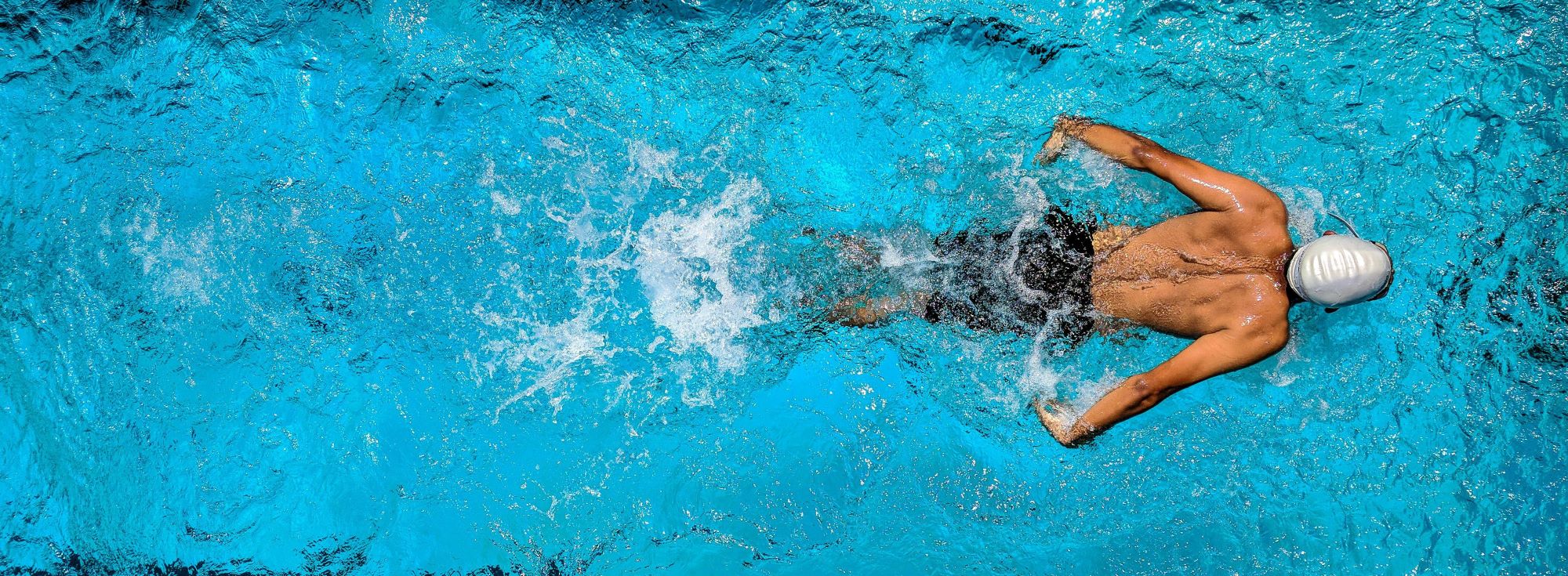
01 Jul The Risks of Swimming for Oral Health
This Summer, many of us may dive into swimming as a refreshing escape and an excellent form of exercise. However, this popular activity might be less friendly to our oral health than we think. Not only can chlorinated pools pose hidden dangers to our teeth and gums, even regular pools can! Today, we’ll explore how exposure to pool chemicals affects our oral environment. But just what are some of these hidden dangers?
Swimmer’s Calculus
Did you know that regular dips in a chlorinated pool might lead to a dental condition called swimmer’s calculus? This issue arises when chlorine builds up on your teeth. Initially, this buildup might only yellow your teeth, but the implications don’t stop there. Over time, the persistent chlorine exposure can erode your tooth enamel. Notoriously tough to clean, swimmer’s calculus isn’t just a cosmetic concern. If it is left unchecked, it can cause more severe problems like tooth decay and gum disease.
Tooth Sensitivity
Another thing you might notice after swimming is a heightened sensitivity in your teeth. This discomfort may be especially noticeable when you eat or drink something very hot or very cold. It could actually stem from the effects of chlorine exposure. Over time, chlorine can lead to a build-up known as swimmer’s calculus on your teeth. This build up not only discolors your teeth but also wears down the enamel.
The enamel is the protective outer layer of your teeth. As this enamel layer becomes thinner, your teeth become more vulnerable to temperature changes. Unfortunately, this can result in increased sensitivity. This gradual enamel erosion is a direct consequence of the accumulation of swimmer’s calculus, which makes enjoying your favorite hot or cold treats a bit less pleasant.
Barodontalgia
Have you ever heard of barodontalgia, or as some might call it, tooth squeeze? Don’t feel bad if you haven’t! This condition typically emerges more commonly among those who engage in scuba diving swimming in deep pools. Barodontalgia happens when the intense water pressure surrounding you exerts force on your teeth and gums. This pressure can cause significant swelling and discomfort. The root cause of barodontalgia often ties back to existing dental issues. If you have untreated cavities, compromised dental restorations like fillings or crowns, or even a hidden tooth fracture, you’re more susceptible to this condition.
The air trapped in your tooth or around your dental work needs to adjust to the changing pressure as you dive deeper. This adjustment can cause the air to expand or contract, putting stress on your tooth structure and any dental work. It is a sad fact, but discomfort from barodontalgia is not just a temporary annoyance. It can actually cause lasting damage such as tooth fractures or even dislodge your dental restorations. Experiencing a sharp pain in your tooth while diving or swimming deep should not be ignored, as it might indicate underlying dental problems that need attention. This type of dental pain is unique because it directly correlates with the environmental pressures faced during underwater activities. If you’re an avid swimmer or diver, being aware of and addressing any dental issues can help prevent the painful and possibly serious effects of barodontalgia.
Oral Injury
Swimming, just like any other physical activity, comes with its own set of risks. One such risk is the potential for oral injuries. These can happen quite easily, especially if you accidentally knock your teeth against the pool deck or collide with an object while swimming. And it’s not just casual swimmers who are at risk. Those who participate in water sports are even more prone to such injuries. The fast-paced, often unpredictable environment of sports like water polo or synchronized swimming increases the likelihood of contact with hard surfaces or other players. An unexpected elbow or a missed catch can lead to a direct hit to the mouth, resulting in chipped or broken teeth, or even more severe dental trauma.
Although pain is often the only repercussion we consider, these kinds of incidents are more than just that. They can also lead to long-term dental issues if not properly addressed. Whether you’re a competitive athlete or a leisurely swimmer, it’s important to be aware of the environment and practice caution while in the water. Taking preventive measures such as wearing a mouthguard can significantly reduce the risk of oral injuries. It’s a simple step that can save a lot of pain and trouble down the line. So next time you dive into the pool, remember that protecting your smile is just as important as perfecting your stroke.
How to Stay Safe While Swimming
Wondering how you can stay safe while enjoying the pool? Well, there are several tips that you should consider.
- Keep an eye on chlorine levels: Regularly check and adjust the chlorine in your home pool. Follow instructions on proper amounts and ensure your pool maintains a steady balance. If you’re unsure about the chlorine content in a pool, take a look at the condition of the pool’s walls, railings, and ladders. Extensive erosion could indicate high chlorine levels and more acidic water. Try to limit your time in pools with high chlorine levels to reduce exposure.
- Keep up with dental check-ups: Regular visits to the dentist are crucial, especially if you engage in activities like scuba diving. Avoid diving for at least 24 hours after dental procedures that involve anesthesia to prevent any complications.
- Follow pool safety protocols: Practicing pool safety can significantly reduce the risk of injuries. Make sure not to dive into shallow water, run around the pool deck, or swim alone. These precautions help prevent accidents and ensure a safer swimming environment.
Conclusion
In conclusion, staying safe while swimming involves more than just knowing how to swim. It’s about managing chlorine levels, maintaining regular dental checkups, and adhering to pool safety rules. Schedule an appointment with Augusta Family Dental to establish a dental plan that keeps your teeth safe. By taking these precautions, you can enjoy the benefits of swimming while minimizing risks to your oral and overall health.

About Our Team
Our team of dental experts has well over 30 years of combined experience in the field of dentistry. To learn more about them, please visit the team pages for Hephzibah, Washington Road, Summerville, and Medical District locations.

Sorry, the comment form is closed at this time.